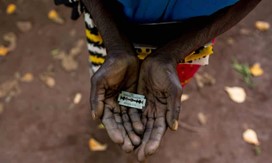Liberia decides: Arcelor Mittal Vs. HPX
Long-term gain vs. short-term foreign demands,

Liberia finds itself at another turning point. The choices made in the coming weeks could determine whether the country moves forward with sustainable development or falls victim to external pressure that prioritizes foreign profit over national interest.
The amended Mineral Development Agreement (MDA) signed in 2021 between the Government of Liberia and ArcelorMittal Liberia (AML) is at the center of this dilemma. The agreement, originally valued at $800 million and now expanded to $1.2 billion, outlines a bold commitment by AML to invest in a modern iron ore concentrator, increase production capacity, generate over 2,000 new direct jobs, and inject life into local supply chains and vocational training across mining communities.
This is not speculative. Over the past two decades, AML has invested over $1.7 billion in Liberia. The company currently employs more than 7,000 Liberians and remains the largest taxpayer and private sector employer in the country. Its investments have not only boosted national revenue but also brought tangible improvements to infrastructure, education, health, and community development in host counties.
Yet despite this track record, the expansion agreement remains stalled. Why? Because High Power Exploration (HPX) and its subsidiary, Ivanhoe Liberia, are lobbying relentlessly to have AML stripped of its status as operator of the Yekepa to Buchanan railway—Liberia’s only functional mineral transport corridor. Their demand comes with no offer of investment, no proposal to improve the line, and no history of contributing to Liberia’s economy.
HPX has never operated a mine in Liberia. It pays no taxes here. It has built nothing, employed no Liberians, and offers no social development initiatives. Its only interest is to use Liberia’s railway and port to export Guinean ore—a venture that would generate modest transit fees at best, while bypassing the core pillars of economic growth: employment, training, and infrastructure development.
It is important to underscore that the existing MDA already guarantees third-party access to the rail. HPX is free to use the line under the terms of the agreement. What it is not entitled to do is dictate who manages the infrastructure built and maintained by another investor.
The push to remove AML as operator has no legal or economic foundation. It is a political campaign rooted in misinformation and designed to undermine an agreement that balances foreign investment with national sovereignty.
Liberia cannot afford to be misled again. Rejecting the AML expansion for the second time would mean:
• Losing over 2,000 direct jobs and tens of thousands of indirect livelihood opportunities
• Sacrificing $200 million in annual economic value that would come from increased operations
• Abandoning new training and capacity-building programs for Liberian youth
• Crippling the confidence of current and future investors who are watching how Liberia treats those who invest in its growth
The idea that Liberia should hire a separate, independent rail operator—funded by its own limited public resources—while sidelining a company offering the service free of charge is not only illogical, it is fiscally irresponsible.
No serious investor would accept building a billion-dollar asset, only to be told later that another party with no investment history should be given control. And no responsible government should endorse such a policy unless it intends to chase away capital, jobs, and credibility.
This is not just about one company or one deal. It is about the kind of country Liberia wants to be.
Will Liberia reward those who build and believe in its future, or will it bend to the will of opportunists who offer nothing but pressure and promises?
President Joseph Boakai has the opportunity to break the cycle of missed opportunities that plagued his predecessor. He can choose leadership rooted in logic, fairness, and long-term national interest. Or he can allow Liberia to be used as a mere transit corridor for the benefit of foreign extractors.
The country has already paid a steep price for hesitation in 2021. It must not pay again.



















